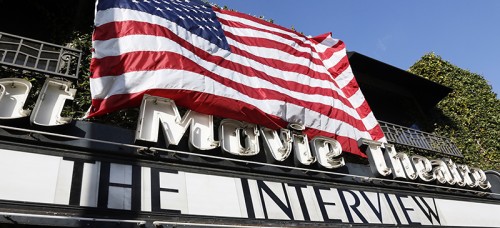
As Sony planned to release its North Korea critical film “The Interview,” — which depicts the fictional death of North Korean leader Kim Jong-un — a mysterious group calling themselves the Guardians of Peace hacked into Sony’s computers in late November 2014 and leaked three films, including “The Interview.” The act led to renewed tensions between the two countries that intensified with the release of a plethora of confidential Sony information, such as emails, to the public.
In December, before the official release of the film, the Guardians of Peace demanded that Sony not release “The Interview.” If Sony chose to continue with the release, the hackers threatened to attack the malls and movie theaters where the movie would be screened.
Sony initially canceled the theater release of “The Interview” while under pressure from theater chains located in the threatened malls. However, they later chose to release the film online and in select theaters.
Many, including the U.S. government, suspect the hack was North Korea’s doing, following their criticism of “The Interview” during the summer.
The FBI announced in January that it had substantial proof that North Korea was behind the Sony hack. While the FBI hasn’t released their findings, historical patterns point to North Korea.
“What the FBI is basing themselves on is that they’ve got a track record of other hacking incidents that have footprints and fingerprints by the way it was done,” Richard Farkas, a political science professor, said. “So this was done the North Korean way.”
Following the FBI announcement, President Obama stated that sanctions would be applied to key parts of the North Korean government who were suspected of involvement in the hacking. According to the New York Times, 10 government officials and the state intelligence agency were included on this list.
Sanctions have traditionally been an effective soft-power weapon against North Korea. “It’s just like if your bank account is frozen, then you can’t write a check, you can’t buy anything,” Jin Choi, associate professor at the Driehaus College of Business, said.
Yet sanctions can have counterproductive ramifications. “If you’re in that situation, how would you carry out your economic activity?” asked Professor Choi. “You become more underground and more illegal.”
Tensions have remained prevalent since the Korean Armistice Agreement of 1953, which ended the active fighting of the Korean War. The United States, who came to the defense of South Korea, has remained a staunch ally since the war, standing in direct opposition to North Korea and its threatening rhetoric.
However, it is important to note that the agreement only ended active hostilities; the North and South never subsequently signed an official peace treaty.
“As far as North Korea is concerned, they are still at war with South Korea and the U.S. because the U.S. was the lead nation in the U.N. forces that came to the aid of South Korea,” Choi said. “After 65 years, North Korea still thinks the war is going on.”
Of major concern to the United States and the Western world is North Korea’s nuclear weapons program, when in 2009 a nuclear missile was successfully tested.
“The U.S., South Korea and the rest of the Western world is looking at it as a provocative act,” Choi said. “Once they make nuclear weapons, they are going to export to other hostile countries.”
Yet North Korea’s decision to make such weapons is not without reason. “They were saying they were trying to defend themselves against other nations with nuclear weapons like the U.S.; we are only to be equal to the threats, not necessarily to the threats of other parts of the world,” Choi said.
Although the spotlight often falls between the United States and North Korea, the United States has a vested interest in South Korea. “The key is our relationship with South Korea,” Farkas said. “On the one hand, the enemy of my enemy is my friend, so the fact that the South and the North confront one another means that South Korea and the United States should be on the same page.”
But the relationship isn’t so black and white. “The reality, though, is politics in South Korea is a bit embarrassing for those people who want to make the case that its democratic. It has some very undemocratic features,” Farkas said. “So given that’s the case, you can’t run up on the flag pole very easily, that South Korea is democratic and North Korea is the opposite, and that’s why we are friends with South Korea.”
China, North Korea’s traditional major ally, has started to distance itself. “China’s turned a corner,” Farkas said. “China has a series of interests in sustaining a relationship with the West, especially in terms of marketing and goods. North Korea then is just a problem and an embarrassment.”
And as expected, one who is cornered can act quite desperately and unpredictably. “The only thing that is threatening about North Korea is that they’re so simplistic about some things that they are a bit unpredictable,” Farkas said.

